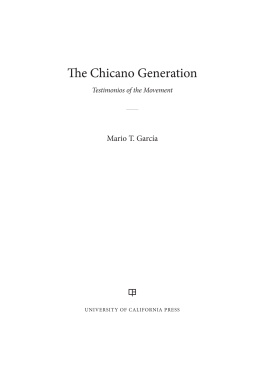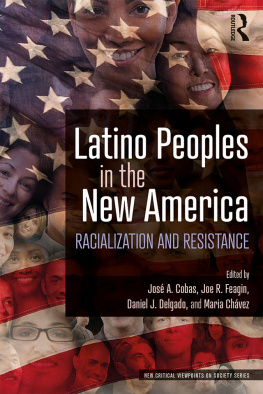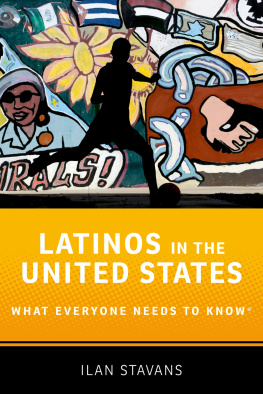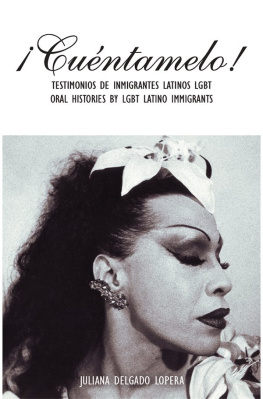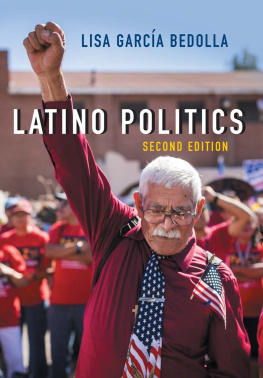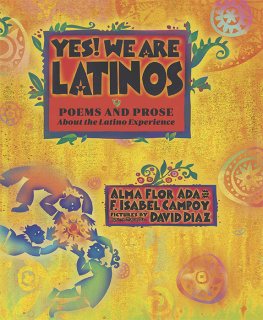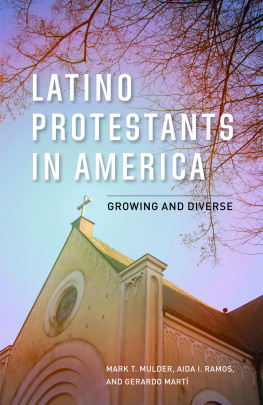THE LATINO GENERATION
This book was published with the assistance of the Thornton H. Brooks Fund of the University of North Carolina
2014 THE UNIVERSITY OF NORTH CAROLINA PRESS
All rights reserved. Manufactured in the United States of America.
Designed by Sally Scruggs and set in The Serif and The Sans types by codeMantra.
The paper in this book meets the guidelines for permanence and durability of the Committee on Production Guidelines for Book Longevity of the Council on Library Resources. The University of North Carolina Press has been a member of the Green Press Initiative since 2003.
Library of Congress Cataloging-in-Publication Data
Garca, Mario T.
The Latino generation : voices of the new America / Mario T. Garca.
pages cm
Includes bibliographical references and index.
ISBN 978-1-4696-1411-3 (hardback) ISBN 978-1-4696-1412-0 (ebook)
1. Hispanic American college students. 2. Hispanic Americans. I. Title.
LC2670.6.G37 2014
378.198268073dc23 2013041625
18 17 16 15 14 5 4 3 2 1
To my daughter, Giuliana, and to my son, Carlo,
part of the Latino Generation,
AND
in memory of Sal Castro
CONTENTS
ACKNOWLEDGMENTS
I would like to first thank my former students whose stories serve as the basis of this book for their support for this project and their patience. I am proud of them and equally proud to present their inspiring narratives.
I want to thank my research assistants, Taylor Rentera and Amber Workman, for transcribing some of the interviews, helping to edit the manuscript, and assisting me in various other ways.
At the University of North Carolina Press, I want to thank my longtime editor, Charles Grench, for his support for this project. Thanks also to the staff of the press who worked with me on the review process and in the publication of the book.
I am grateful to the two anonymous readers who provided me with very thoughtful and important suggestions for revisions, especially concerning the introduction.
I was aided in my work by grants and support from the Chicano Studies Institute at the University of California, Santa Barbara; UC MEXUS; and the Academic Senate at UCSB.
I am indebted to Eddie Peralta in instructional development at UCSB, who expertly processed all of the photos for publication.
Finally and as always, my love and admiration go to Professor Ellen McCracken, who helped inspire this project and provided her moral support. Of course, I also want to acknowledge my children, Giuliana and Carlo, who are part of the Latino Generation.
THE LATINO GENERATION
INTRODUCTION
The reciprocal process of interaction between the historian and his facts, what I have called the dialogue between present and past, is a dialogue not between abstract and isolated individuals, but between the society of today and the society of yesterday.
EDWARD HALLETT CARR, What Is History? (1961)
Latinos in American Society
Latinos are now the largest minority in the United States, but they also are the least understood. Stereotypes and gross generalizations abound concerning this significant and growing ethnic group. This study about the life stories or the truths of what I call the Latino Generation is an attempt to challenge these distortions that are fueled by anti-immigrant or nativist views toward Latinos, as more recently witnessed in a number of states such as Arizona, Alabama, and Georgia that have passed anti-immigrants laws aimed at Latinos. In this study, I try to go beyond the superficial views about Latinos, including Chicanos (Mexican Americans), Central Americans, and other Latino groups, held by a number of non-Latinos and to present contemporary young Latinosin their own voicesas whole and complex Americans. Defying the charges of being illegal aliens, foreigners, strangers, and un-American or anti-American, the oral histories or testimonios of these representatives of the Latino Generation in this volume belie all of these indictments and instead reveal aspiring and committed young Americansthe voices of the new America.
I tell students in my courses on Chicano studies that there are three main reasons why it is important for all of us, whatever ethnic background we are from, to have a deeper understanding of Latinos. First, just the demographics alone should force us to learn more. Latinos, as the largest U.S. minority, represent some 53 million people and 16 percent of the total U.S. population. It is estimated that by 2050, Latinos will make up close to one-third of all Americans. This means that all Americans will be directly and indirectly affected by these demographic changes and will surely be in some form of contact with Latinos. For this practical reason alone, it is important we know about them. Who will fill the openings for our skilled workers and professionals in the future if not Latinos? Economic self-interest would dictate that we know about Latinos, since the economic fortunes of the country will be based on our abilities to integrate them into the key sectors of the economy if the United States is to remain competitive in world markets. Yet to do so, we need to overcome common stereotypes that Latinos are not capable of achieving quality and demanding education. This pragmatic equation should almost mandate our increased awareness of the Latino population.
The second reason that I mention to my students is that we cannot fully appreciate the history of the United States and its culture without including the stories of many ethnic groups, such as Latinos, that we have tended in the past to ignore or marginalize. Latinos, especially Mexican Americans, have a long and important history in the United States. Despite the stereotype that portrays Latinos as just off the boat (although for most Latinos, no boat is needed to cross a mostly land border), the fact is that people of Latino background have been a part of this country for generationsand in some cases, for centuries. For example, Mexican Americans (or Hispanos, as some call themselves) have been living in the area of present-day New Mexico since the first Spanish settlements appeared in 1598. Others were living in the Southwest at the time of the U.S. conquest and annexation of this area (referred to as El Norte by Mexico) as the result of the U.S.-Mexican War (184648). During the early twentieth century, over a million Mexican immigrants crossed into the United States to work on the railroads, farms, mines, and growing urban areas in the Southwest and Midwest at the same time that millions of new immigrants from eastern and southern Europe also arrived as the so-called New Immigrants. Throughout most of that century, still other Mexican immigrantsalso joined by Puerto Ricans, Cubans, Dominicans, and Central Americansentered and added to the growing but heterogeneous Latino population. As newcomers from Mexico and other Latin American areas settled permanently, new generations of U.S.-born Latinos added to this population. This history plus continued emigration from Mexico and Latin America has contributed to the current and sizable Latino communities in the United States. This long and varied history of Latinos underscores the importance of integrating their stories into our understanding of the American experience. Too often, I further tell my students, when we say American, what is important is not whom we include but whom we exclude. From an intellectual and academic perspective, it is important to know and study the Latino experience if we are to fully understand American history and American studies. We need a more inclusive history, and the inclusion of Latinos into that history is one way of achieving this.


